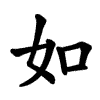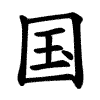Definify.com
Definition 2026
田
田
Translingual
| Stroke order | |||
|---|---|---|---|

| |||
| Japanese stroke order | |||
|---|---|---|---|

| |||
Han character
田 (radical 102 田+0, 5 strokes, cangjie input 田 (W), four-corner 60400)
- Kangxi radical #102, ⽥ (“field”).
References
- KangXi: page 756, character 11
- Dai Kanwa Jiten: character 21723
- Dae Jaweon: page 1167, character 1
- Hanyu Da Zidian: volume 4, page 2524, character 1
- Unihan data for U+7530
Chinese
Glyph origin
| Historical forms of the character 田
| ||||
|---|---|---|---|---|
| Oracle bone script | Bronze inscriptions | Bamboo and silk script | Large seal script | Small seal script |
 |
 |
 |
 |
 |
| Characters in the same phonetic series (田) (Zhengzhang, 2003) | |
|---|---|
| Old Chinese | |
| 田 | *l'iːŋ |
| 佃 | *l'iːŋ, *l'iːŋs |
| 畋 | *l'iːŋ, *l'iːŋs |
| 畇 | *l'iːŋ, *sqʰʷin, *sɢʷin, *ɢʷin |
| 鈿 | *l'iːŋ, *l'iːŋs |
| 沺 | *l'iːŋ |
| 甸 | *l'iːŋs |
Pictogram (象形) – pictographic representation of a field.
Etymology 1
|
simp. and trad. |
田 | |
|---|---|---|
From Proto-Sino-Tibetan *b-liŋ (“field”).
Pronunciation
- Mandarin
- Cantonese (Jyutping): tin4
- Hakka (Sixian, PFS): thièn
- Min Dong (BUC): dièng
- Min Nan
- Wu (Wiktionary): di (T3)
- Mandarin
- (Standard Chinese, Beijing)+
- Pinyin:
- Zhuyin: ㄊㄧㄢˊ
- Wade-Giles: t'ien2
- Gwoyeu Romatzyh: tyan
- IPA (key): /tʰi̯ɛn³⁵/
- (Standard Chinese, Beijing)+
- Cantonese
- (Standard Cantonese, Guangzhou)+
- Jyutping: tin4
- Yale: tìhn
- Cantonese Pinyin: tin4
- IPA (key): /tʰiːn²¹/
- (Standard Cantonese, Guangzhou)+
- Hakka
- (Sixian, incl. Miaoli and Meinong)
- Pha̍k-fa-sṳ: thièn
- Hakka Romanization System: tienˇ
- Hagfa Pinyim: tian2
- IPA: /tʰi̯en¹¹/
- (Sixian, incl. Miaoli and Meinong)
- Min Dong
- (Fuzhou)
- Bàng-uâ-cê: dièng
- IPA (key): /tieŋ⁵³/
- Note: literary.
- (Fuzhou)
- Min Nan
- (Hokkien)
- Pe̍h-ōe-jī: tiân
- Tâi-lô: tiân
- Phofsit Daibuun: dieen
- IPA (Xiamen): /tiɛn²⁴/
- IPA (Quanzhou): /tiɛn²⁴/
- IPA (Zhangzhou): /tiɛn¹³/
- IPA (Taipei): /tiɛn²⁴/
- IPA (Kaohsiung): /tiɛn²³/
- Note: literary.
- (Teochew)
- Peng'im: tiêng5 / tiang5
- Pe̍h-ōe-jī-like: thiêng / thiâng
- IPA (key): /tʰieŋ⁵⁵/, /tʰiaŋ⁵⁵/
- Note: literary.
- (Hokkien)
- Wu
- (Shanghainese)
- Wiktionary: di (T3)
- IPA (key): /d̻i²³/
- (Shanghainese)
| Rime | |
|---|---|
| Character | 田 |
| Reading # | 1/1 |
| Initial (聲) | 定 (7) |
| Final (韻) | 先 (85) |
| Tone (調) | Level (Ø) |
| Openness (開合) | Open |
| Division (等) | IV |
| Fanqie | 徒年切 |
| Reconstructions | |
| Zhengzhang Shangfang |
/den/ |
| Pan Wuyun |
/den/ |
| Shao Rongfen |
/dɛn/ |
| Edwin Pulleyblank |
/dɛn/ |
| Li Rong |
/den/ |
| Wang Li |
/dien/ |
| Bernard Karlgren |
/dʱien/ |
| Expected Mandarin Reflex |
tián |
| Baxter-Sagart system 1.1 (2014) | |
|---|---|
| Character | 田 |
| Reading # | 1/1 |
| Modern Beijing (Pinyin) |
tián |
| Middle Chinese |
‹ den › |
| Old Chinese |
/*lˤiŋ/ |
| English | field; to hunt |
Notes for Old Chinese notations in the Baxter-Sagart system: * Parentheses "()" indicate uncertain presence; | |
| Zhengzhang system (2003) | |
|---|---|
| Character | 田 |
| Reading # | 1/1 |
| No. | 12392 |
| Phonetic component |
田 |
| Rime group |
眞 |
| Rime subdivision |
2 |
| Corresponding MC rime |
田 |
| Old Chinese |
/*l'iːŋ/ |
Definitions
田
Compounds
|
|
|
Etymology 2
|
simp. and trad. |
田 | |
|---|---|---|
| alt. forms |
塍 堘 |
|
The Min native word for “paddy field; field”.
Etymology unknown. The original word has been identified as 塍 (OC *ɦljɯŋ, “raised path between fields”), although Norman proposes that this is related to 層 (OC *zɯːŋ, “layer”), reflecting the terraced fields commonly found in Fujian (Schuessler, 2007). Compare also 㽪 (“wet field”).
Pronunciation
- Min Dong
- (Fuzhou)
- Bàng-uâ-cê: chèng
- IPA (key): /t͡sʰɛiŋ⁵³/
- (Fuzhou)
- Min Nan
- (Hokkien)
- Pe̍h-ōe-jī: chhân
- Tâi-lô: tshân
- Phofsit Daibuun: zhaan
- IPA (Xiamen): /t͡sʰan²⁴/
- IPA (Quanzhou): /t͡sʰan²⁴/
- IPA (Zhangzhou): /t͡sʰan¹³/
- IPA (Taipei): /t͡sʰan²⁴/
- IPA (Kaohsiung): /t͡sʰan²³/
- (Teochew)
- Peng'im: cang5
- Pe̍h-ōe-jī-like: tshâng
- IPA (key): /t͡sʰaŋ⁵⁵/
- (Hokkien)
Definitions
田 (Min)
- paddy field; wet field
- farmland in general; field
Compounds
Japanese
Kanji
Readings
Usage notes
Note that the rice paddy meaning is specific to Japanese. The Chinese word for rice paddy is 水田.
Compounds
Etymology
| Kanji in this term |
|---|
| 田 |
|
た Grade: 1 |
| kun'yomi |
From Old Japanese. Appears in the Kojiki written in roughly 711-712.[1]
Pronunciation
Noun
Usage notes
The term ta can refer to either a wet field as for rice agriculture, or a dry field as for other crops. This term does not refer to a wild field or meadow.
Derived terms
|
References
- ↑ 1988, 国語大辞典(新装版) (Kokugo Dai Jiten, Revised Edition) (in Japanese), Tōkyō: Shogakukan
- ↑ 2006, 大辞林 (Daijirin), Third Edition (in Japanese), Tōkyō: Sanseidō, ISBN 4-385-13905-9
- ↑ 1998, NHK日本語発音アクセント辞典 (NHK Japanese Pronunciation Accent Dictionary) (in Japanese), Tōkyō: NHK, ISBN 978-4-14-011112-3